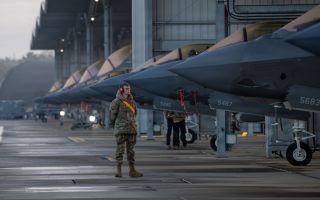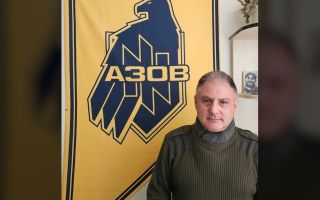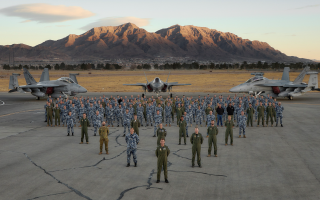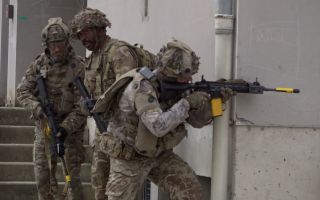
Exclusive: European human rights laws make good guys the bad guys, ex-SAS soldiers warn

There is "anger" among the SAS community about how the UK's elite soldiers are scrutinised against the European Court for Human Rights legislation for actions taken on operations, with them left feeling "abandoned".
However, Joshua Rozenberg, Britain's longest-serving legal commentator, has said the Human Rights Act and the Human Rights Convention haven't "made such a huge difference" to the way the military can operate.
Aldwin Wight, who was the commanding officer of 22 SAS from 1992 to 1994, and George Simm, the regimental sergeant major at the same time, were speaking on the latest episode of the Sitrep podcast – which analyses the top defence stories of the week and is available wherever you get your podcasts.
- British Army and US snipers train alongside Special Forces in California desert
- Final ultimatum for Mercer after his request to withhold special forces names from inquiry denied
- New Chief of the General Staff: British Army needs to be 'more Special Forces'
They told BFBS Forces News that members of the Armed Forces, especially those from Special Forces, could be prosecuted under European Court of Human Rights legislation after they had carried out missions on behalf of their country.
Mr Wright said sending soldiers to do their jobs and then facing legal action years down the line represented a "breach of trust" between the Government and forces personnel.
"What you do is you commit soldiers to extreme circumstances where they put themselves in the line of fire," he said.
"And then subsequently, what you do is you leave soldiers open to, as it were, grievous legal process… or vexatious legal process two decades later, which actually goes on and on.
"It's a process [where] few of these actually reach final conclusion, but the employer, the Government, gives funds to lawyers to take out cases against the soldiers that work for the Government.
"And I can't work out any other employer that would take that line of action."
He also explained that after every operation there is a "full forensic wash-up" with statements being taken.
"This is not done in some kind of freelance manner," he said. "This is done as authorised by ministers and by the chain of command."
It comes after Tory leadership hopeful Robert Jenrick said it would be hard for British forces to carry out an operation like the one the US carried out "to kill or capture Osama bin Laden" as a result of human rights laws.
He is not the only politician who waded into the argument, with former defence secretary Ben Wallace calling the legislation "lunacy".
Speaking after he stepped down from the cabinet in 2023, Mr Wallace said the human rights laws from ECHR both thwart efforts to stop terrorists and have become a serious risk to national security.
And yet Mr Simm said successive governments since 2000 had ignored the impact the ECHR has had on Special Forces operations.
"They've allowed this collision between this very rigid legal framework, that changes... to compete with the chaos," he said.
"The tragedy of combat, that moment when it all goes down.
"And they try and unpick it and try and make that scenario fit their framework. And, of course, it doesn't. It just doesn't work."
Mr Simm said this has left SAS soldiers feeling abandoned.
"We were at a funeral a couple of weeks ago in Hereford," he said. "One of our young blokes who died sadly, and the community there is much more upset, they're not happy and they feel cut off, they feel abandoned.
"And you've just got to extrapolate that into current operations and you start to see the danger that we allude to in that letter.
"Because if you are not determined, if we don't believe that what we're doing is on behalf of the British people and we're going to be punished for it – what's the point?"
He added that what then happens is "the good guys who are the bad guys [and] the bad guys are now the good guys".
"The people who will pay the bill won't be the public," he said. "We are being prosecuted and terrorists are given immunity.
"I mean, it's absurd and it doesn't really matter how they intended it or how it evolved – the reality is what I've just said."
However, Mr Rozenberg told the podcast he thought some of what the SAS veterans were saying was "a bit confused".
"There have been prosecutions arising from events in Northern Ireland, but I don't believe there have been prosecutions arising from alleged incidents in more recent conflicts – Afghanistan, for example," he said.
"But that is a subject of a public inquiry commissioned by the Ministry of Defence, conducted by serving appeal judge Sir Charles Hatton Cave, into allegations of unlawful killings, in other words, murder.
"I don't think that any of your viewers and listeners, and certainly not the people we've been hearing from just now would condone murder.
"They would say that they are acting according to the rules of engagement and they're behaving perfectly properly.
"And if so, they have nothing to fear either from military justice or from civilian justice in the UK and certainly not from the European Court of Human Rights."
Mr Simm also said personnel were brought in front of public inquiries over missions they carried out, which includes contemporaneous accounts of the operations – taken after every operation.
But this, he said, is a "fishing exercise" that leads to personnel "self-incriminating".
He also pointed out that the veterans have tried numerous times to be heard, but are continuously ignored.
"I decided to… write to the chain of command in the first instance two years ago and just flag up 'Could somebody please do their job?'" he said.
"We do our job, thanks very much. We don't need any help. But could somebody please represent us because nothing's happening and it's just getting worse."
Mr Rozenberg said on this point, he understood where the veterans were coming from.
"They're fully entitled to the support of the chain of command, ultimately of the Ministry of Defence of the UK Government," he said.
The legal expert finished by saying that the military personnel will have nothing to fear if they are given proper orders to obey.
"The new attorney general, Lord Hermann Casey, says that he's absolutely committed to observing international law, international human rights law, international laws of war," he said.
"And that is a requirement that will filter down to troops on the ground.
"But provided they are given proper orders and provided they obey them, I don't think they should have much to fear."
You can listen to Sitrep wherever you get your podcasts, including on the Forces News YouTube channel.









